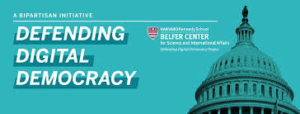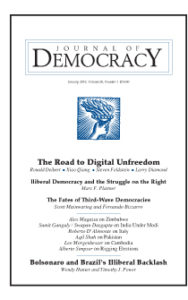 Digital technology can be used in the service of liberal or authoritarian societies, strengthening both government accountability and repressive capabilities. It has led to unprecedented access to and exchange of information, and it has amplified the spread of misinformation, echo chambers and propaganda, thereby possibly contributing to rising populism and the polarization of democratic societies, notes analyst Kevin Körner.
Digital technology can be used in the service of liberal or authoritarian societies, strengthening both government accountability and repressive capabilities. It has led to unprecedented access to and exchange of information, and it has amplified the spread of misinformation, echo chambers and propaganda, thereby possibly contributing to rising populism and the polarization of democratic societies, notes analyst Kevin Körner.
How democracies approach this challenge will be a key factor for their performance in the intensifying competition of political systems. The experience of the last few years and mounting anecdotal evidence helps to identify some key areas where digital technology can threaten to undermine and destabilize democracy, he writes in Digital politics: AI, big data and the future of democracy:
 — Misinformation, echo chambers, and targeted manipulation
— Misinformation, echo chambers, and targeted manipulation
— Tectonic shifts of financial and political power in the data economy
— Loss of privacy and user sensitivity
— Persuasive technology and social media addiction
— Erosion of civil rights through algorithmic bias
— Mass surveillance and the strengthening of authoritarianism
— Impact of AI and automation on competitiveness and the support for
democracy.
Loss of trust.
 The continuous spread of conspiracy theories and other factually incorrect or highly biased information undermines citizens’ ability to identify ‘objective’ or shared truth, he observes in the report, prepared for Deutsche Bank Research. This can lead to a distrust of all media, fatalism and disengagement among parts of the population, severely damaging the societal dialogue and amplifying political divisions, Körner adds (citing Ronald J. Deibert’s The road to digital unfreedom: Three painful truths about social media, from the NED’s Journal of Democracy.) This loss of trust serves authoritarian regimes, which aim to destabilize democratic societies that question their own claim to unchecked power as well as delegitimize the liberal democratic model in the eyes of their own populace as dysfunctional, hypocritical and decadent.
The continuous spread of conspiracy theories and other factually incorrect or highly biased information undermines citizens’ ability to identify ‘objective’ or shared truth, he observes in the report, prepared for Deutsche Bank Research. This can lead to a distrust of all media, fatalism and disengagement among parts of the population, severely damaging the societal dialogue and amplifying political divisions, Körner adds (citing Ronald J. Deibert’s The road to digital unfreedom: Three painful truths about social media, from the NED’s Journal of Democracy.) This loss of trust serves authoritarian regimes, which aim to destabilize democratic societies that question their own claim to unchecked power as well as delegitimize the liberal democratic model in the eyes of their own populace as dysfunctional, hypocritical and decadent.
 “Instead of spreading democratic values and liberal ideals, the Internet has become the backbone of authoritarian surveillance states all over the world, note analysts Richard A. Clarke and Rob Knake. Regimes in China, Russia and elsewhere have used the Internet’s infrastructure to build their own national networks. At the same time, they have installed technical and legal barriers to prevent their citizens from reaching the wider Internet and to limit Western companies from entering their digital markets, they write in Foreign Affairs, proposing the formation of an Internet Freedom League as a bulwark against authoritarian abuse of the internet:
“Instead of spreading democratic values and liberal ideals, the Internet has become the backbone of authoritarian surveillance states all over the world, note analysts Richard A. Clarke and Rob Knake. Regimes in China, Russia and elsewhere have used the Internet’s infrastructure to build their own national networks. At the same time, they have installed technical and legal barriers to prevent their citizens from reaching the wider Internet and to limit Western companies from entering their digital markets, they write in Foreign Affairs, proposing the formation of an Internet Freedom League as a bulwark against authoritarian abuse of the internet:
An Internet Freedom League modeled on the Schengen area is the only way to secure Internet freedom from the threats posed by authoritarian states and other bad actors. Such a system would admittedly be less global than today’s more freewheeling Internet. But only by raising the costs of malicious behavior can the United States and its friends hope to reduce the scourge of cybercrime and limit the damage that regimes such as those in Beijing and Moscow can do to the Internet. RTWT
 Technology and democracy remain compatible, Körner insists. As over the
Technology and democracy remain compatible, Körner insists. As over the
past century, technology and communication could remain powerful instruments
to enable citizens, enrich the societal discourse and strengthen democratic
institutions:
- For this, democratic societies need to react to the side effects and threats posed
by technology to their institutions and their citizens’ rights, both at home and
from abroad. Governments need to update regulation, competition rules and
supervision to account for the transformed requirements of the data economy. - Companies need to ensure that their business models and products are
compatible with constitutional rights and the integrity of democratic institutions
and processes. Users and citizens need to better understand the algorithms and
designs behind their apps and devices as well as the mechanics of the data
economy. - Democratic societies need an informed dialogue on data and
technology ownership on how to share the fruits of technological progress and
on how to prevent increasing asymmetries in wealth and power from
destabilizing their foundations.







